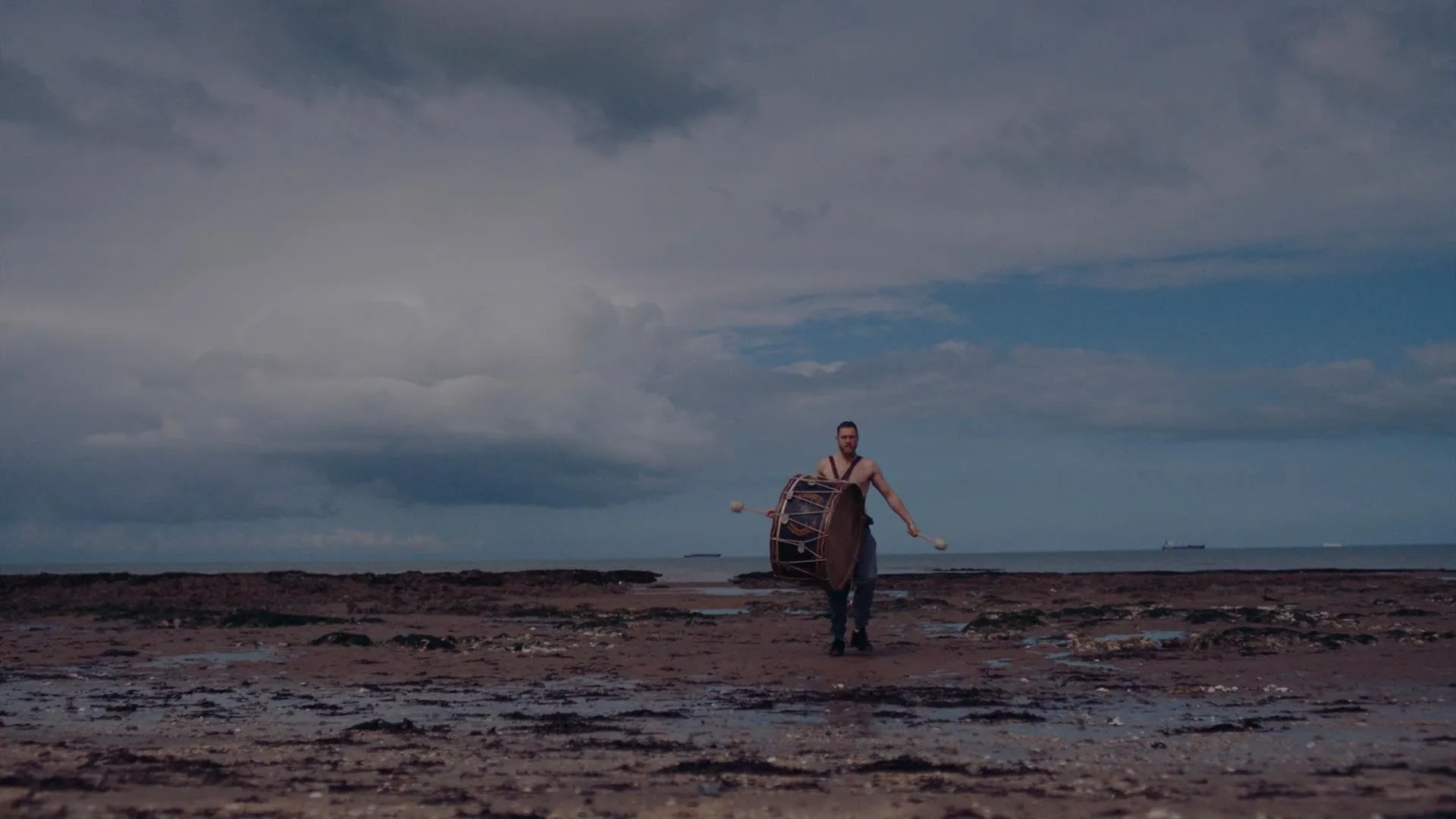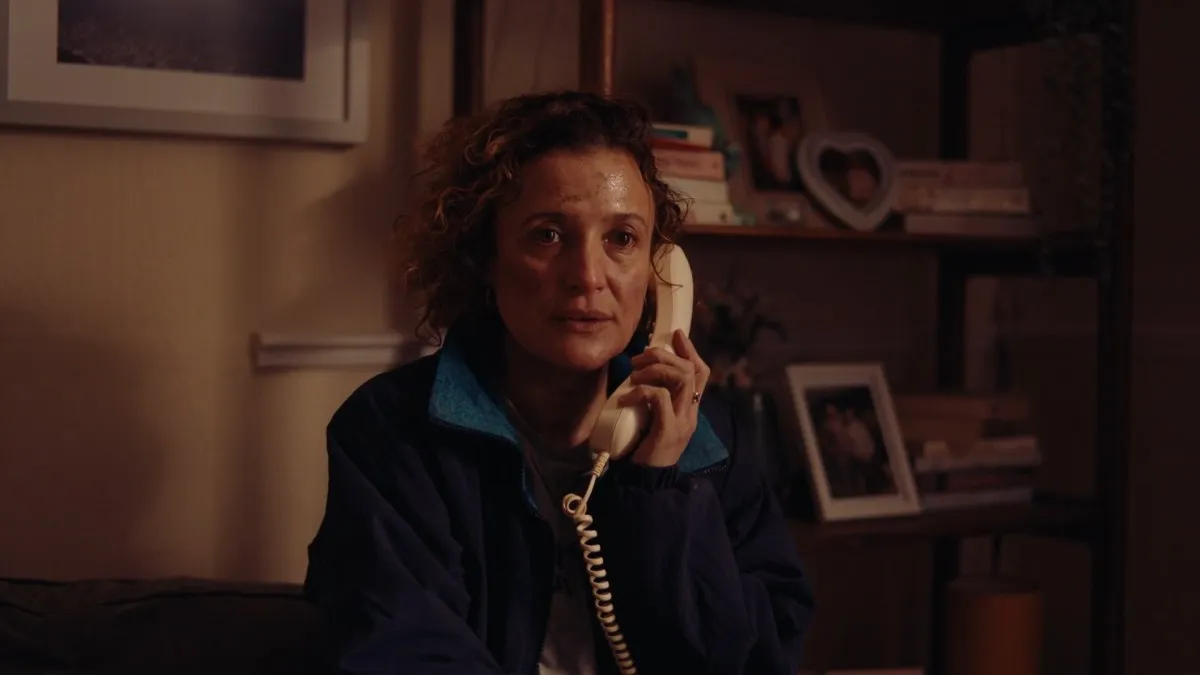Jed Hart’s “Restless” plunges into a primal fear: the invasion of one’s personal sanctuary by relentless, inescapable noise. The film introduces us to Nicky (Lyndsey Marshal), a geriatric nurse whose life, marked by the recent departure of her son to university and the quietude of her terraced house, possesses a fragile order.
She inhabits a world of gentle routines—classical music, solitary baking, the comforting glow of televised billiards. This carefully constructed peace, however, is precariously balanced. The arrival of new neighbors in the adjoining house, formerly her parents’, signals an imminent disruption.
“Restless” establishes itself as a domestic drama teetering on the edge of a psychological thriller, a study in how quickly the mundane can curdle into the menacing when the basic right to quiet is violated. The initial framing effectively sets a tone of unease, hinting at the profound disturbance about to unfold in Nicky’s small, familiar world.
The Architecture of Anxiety: Marshal’s Nicky
At the heart of “Restless” is Nicky’s psychological unraveling, a descent depicted with raw intensity by Lyndsey Marshal. Her performance is a masterclass in conveying a mind fraying under siege. We witness a woman who thrives on control and quietude; her work demands patience, her home is her refuge.
The incessant thumping of techno music and the raucous parties next door chip away at her composure, night after sleepless night. Marshal embodies the physical and mental toll of this auditory assault with unnerving credibility. Her anguish is palpable, often conveyed through wordless expressions of exhaustion and mounting desperation as she navigates her shrinking world, increasingly filmed in near-darkness.
The film’s portrayal of this woman pushed to her limits resonates with studies of intense psychological pressure, somewhat akin to the female-led narratives in Indian parallel cinema where protagonists often grapple with societal and personal demons within confined domestic spaces. While the script occasionally touches upon “empty nester” tropes, Marshal’s performance elevates Nicky beyond stereotype, presenting a deeply human portrait of eroding sanity.
Echoes in the Thin Walls: Society, Self, and Sound
The source of Nicky’s torment is Deano (Aston McAuley), the new neighbor whose lifestyle is an affront to her own. Burly, tattooed, and with a penchant for nocturnal revelries fueled by hard techno, Deano represents an almost archetypal disruptive force.
Nicky’s polite requests for quiet are met with dismissiveness, then hostility, initiating an escalatory spiral. The film taps into a universally relatable “neighbor from hell” scenario, making its core conflict instantly recognizable, much like certain social dramas in global cinema that explore the breakdown of civility in close quarters.
“Restless” also offers a glimpse into specific anxieties of modern British life: the paper-thin walls of terraced housing amplifying every transgression, the perceived ineffectiveness of authorities, and an undercurrent of class tension. Deano, initially a caricature of inconsideration, remains somewhat thinly sketched in terms of motivation, functioning more as a catalyst for Nicky’s transformation. His presence turns Nicky’s home, a space analogous to the cherished ‘ghar’ in many South Asian narratives, from a haven into a source of perpetual stress.
Composing Chaos: Form, Sound, and a Fractured Finale
Jed Hart’s direction employs a claustrophobic visual style, often confining Nicky to dimly lit interiors, heightening the sense of her oppressive reality. The dream sequences, like Deano banging a drum on a silent beach, offer brief, unsettling stylistic departures.
The film’s sound design is a character in itself; it is intentionally maximalist, assaulting the audience much as the noise assaults Nicky, contrasting her classical music with Deano’s jarring beats to underscore her internal turmoil.
This pronounced use of sound to drive the psychological narrative is a powerful tool, though perhaps less melodically integrated than the evocative soundscapes often pivotal in Indian cinematic traditions. “Restless” attempts a tricky blend of domestic drama, psychological thriller, and dark comedy.
The comedic moments, however, sometimes sit uneasily, potentially diluting the carefully built tension. The narrative structure, opening with a scene from late in the story before rewinding a week, creates an initial hook but perhaps contributes to the difficulties the film encounters in its resolution.
The climax itself, and the subsequent tying up of plot threads, feels abrupt and somewhat unconvincing, straining the credibility established earlier. A particular scene involving Nicky’s violent recourse against one of Deano’s acquaintances also introduces a jarring and uncomfortable racial dynamic, leaving a disquieting note.
Restless premiered at the Tribeca Film Festival on June 9, 2024, and was released in the United Kingdom on April 4, 2025. The film became available digitally in the United States on May 23, 2025.
Full Credits
Director: Jed Hart
Writer: Jed Hart
Producers: Benedict Turnbull, Iain Simpson, Jens Nielsen, Sophie Ede, Harri Kamalanathan
Executive Producers: Lyndsey Marshal, Paul Kennedy, David Bird, Robert Watts, David Townend, Tessa Watts, Debbie Pell, Steven Wright, Tim Dunphy
Cast: Lyndsey Marshal, Aston McAuley, Barry Ward, Kate Robbins, Denzel Baidoo, Ciara Ford
Director of Photography (Cinematographer): David Bird
Editor: Anna Meller
The Review
Restless
"Restless" excels with Lyndsey Marshal's powerful portrayal of a woman unraveling and a premise that strikes a deeply relatable chord of invaded domestic tranquility. Its atmospheric sound design is a notable strength, effectively conveying the protagonist's torment. Yet, the film is let down by an unconvincing and somewhat jarring resolution, coupled with tonal imbalances that don't always serve its tense core. It’s a compelling depiction of psychological strain that unfortunately fumbles its landing.
PROS
- Commanding and nuanced lead performance by Lyndsey Marshal.
- Universally resonant and anxiety-inducing central conflict.
- Striking and effective use of sound design to build atmosphere.
- Convincing early depiction of psychological erosion due to stress.
CONS
- Narrative resolution feels abrupt and strains credibility.
- Inconsistent tone, with dark comedy elements sometimes misfiring.
- The primary antagonist could benefit from more developed motivations.
- A late-film scene introduces uncomfortable and problematic optics.


















































